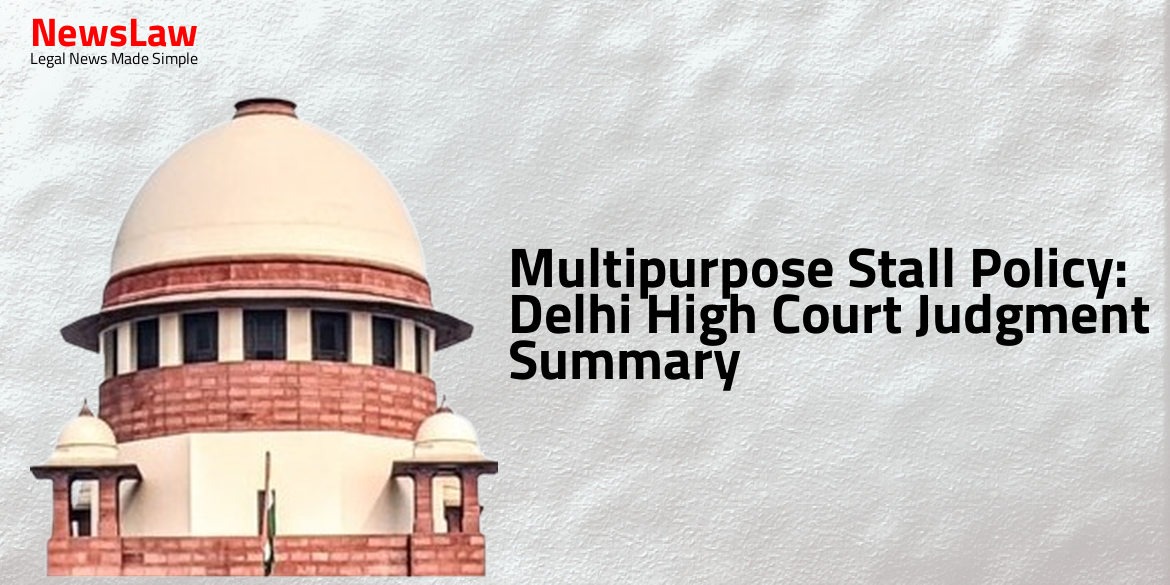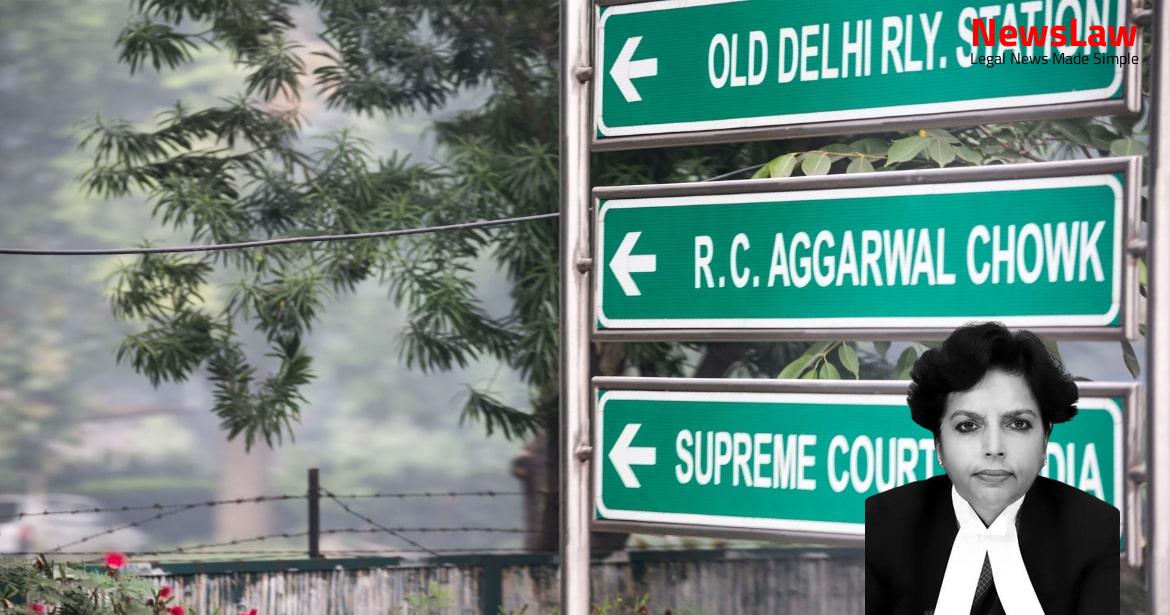In the recent Delhi High Court judgment regarding the Multipurpose Stall Policy, the court addressed the concerns raised by stall/trolley owners operating at railway stations. The petitioners sought renewal/extension of their licenses under the 2017 Policy, which prohibited such renewals beyond the stipulated term. The court deliberated on the validity of this policy, emphasizing principles of equitable opportunities and non-renewable license terms. Let’s delve into the details of this significant legal case.
Facts
- Petitioner no.1 operates three MPS at Bareilly Railway Station.
- Petitioner no.2 operates one MPS at Moradabad Railway Station.
- Petitioner no.3 operates one MPS at Haridwar Railway Station.
- The petitioners were initially running miscellaneous stalls/trolleys as per Commercial Circular No. 96 of 2007.
- In 2017, the respondent no.2/Northern Railway compelled the petitioners to convert their stalls/trolleys to MPS under the 2017 Policy.
- Specific agreements were executed to formalize the license arrangements between the petitioners and respondent no.2.
- The agreements included a Master License Agreement dated 31.03.2021 for Petitioner no.1, dated 29.10.2021 for Petitioner no.2, and dated 17.08.2020 for Petitioner no.3.
- The tenure of the licenses granted to the petitioners was initially set for five years till 21.12.2022 as per Clause 3 of the Master License Agreements.
- The clause explicitly stated that there would be no extension or renewal of the agreement beyond this date.
Arguments
- The petitioners’ licenses stand expired by efflux of time and they have no right to compel the respondent/s to extend the License.
- The 2017 Policy is legally sound and non-arbitrary, applicable universally to stall/trolley owners without discriminatory treatment towards the petitioners.
- The Karnataka High Court in a similar challenge against the 2017 Policy in W.P. (C) 24598/2023 dismissed the petition.
- The petitioners are governed by the 2017 Policy which clearly states no renewal or extension of license.
- The petitioners availed benefits under the 2017 Policy for a tenure of five years and cannot contest it upon expiry of their license.
- Petitioners challenging Clause 5 of the 2017 Policy as violative of Article 14, Article 19(1)(g), and Article 21 of the Constitution.
- Petitioners have a legitimate expectation for license renewal throughout their lifetime and for future generations.
- Petitioners’ coercion claims to convert stalls to MPS units and challenges against Paragraph 1744 of Indian Railways Commercial Manual dismissed.
- Petitioners argue for extension based on reduced license fees post-lockdown and proportionality in license period extension.
- Petitioners claim conversion to MPS units was under economic duress and unequal bargaining power.
- Petitioners maintain that the court has jurisdiction in deciding the petitions.
- Petitioners contest the exclusive jurisdiction clause in license agreements and emphasize an arbitration clause in the 2017 Policy at Clause 18.
- The 2017 Policy prevents license monopolization and promotes equal opportunities at the time of re-tendering.
- The petitioner signed a contract for a non-renewable five-year period with full knowledge
- The petitioner cannot revert to an outdated policy after benefiting from the contract
- The Supreme Court judgment cited by the petitioner does not apply to the Multipurpose Stall Policy in question
- The petitioner’s contract is not under Catering Policy as claimed
- The court rejected the petitioner’s attempt to benefit from policies no longer in effect
Analysis
- The petitioners sought renewal/extension of their licenses under the 2017 Policy/Master License Agreement, despite lack of provisions for renewal or extension in the said agreement.
- The Supreme Court has emphasized the necessity for parties alleging undue influence/coercion to specify the nature of such influence.
- An important provision in the 2017 Policy is the 5-year tenure for MPS units with no provision for extension or renewal, allowing licensees to participate in fresh bids if eligible.
- A provision of 33% sub-quota for women in allotment of MPS units across all reserved categories at stations has been established.
- The invocation of the Force Majeure clause post-lockdown due to Covid-19 for static catering and vending units on railway stations was deemed appropriate.
- The petitioners’ reliance on a broader extension granted to other licensees was deemed irrelevant, as the 2017 Policy clearly outlines the tenure and renewal terms.
- The petitioners were permitted to convert their stalls/trolleys to MPS voluntarily based on the Railway Board’s scheme and renewed their agreements accordingly.
- The provision for reservation in allotment of MPS units aims to rectify disparities and ensure access to livelihood opportunities for marginalized communities.
- The petitioners’ claim of a vested right for perpetual renewal of licenses was dismissed, emphasizing that licenses under the 2017 Policy are non-renewable.
- Clause 5 and Clause 11 of the 2017 Policy, outlining tenure and reservation, were contested by the petitioners but deemed unsustainable.
- The extension of license periods due to Covid-19 lockdown was based on Force Majeure circumstances and the ground realities at the railway stations.
- The doctrine of legitimate expectation could not be claimed as a right in itself, and the petitioners’ expectation for license renewal lacked merit.
- The jurisdiction of the Court to entertain the writ petitions was established based on the location of the authority concerned within the territorial limits.
- The reservation policies for MPS units at stations aim to ensure equitable opportunities and safeguard the rights of weaker sections of society.
- The railway’s policy decisions on license renewals were found to be within the executive’s domain and could not be mandated by the Court.
- The specific part of the judgment (STA) discusses the argument made by the Original Name in regards to the applicability of a particular statute.
- It mentions that the Original Name had put forth various reasons to support their interpretation of the statute.
- The judgment highlights that the Original Name’s arguments were carefully considered by the court.
- It states that the court evaluated the statutory provisions in question in detail to ascertain their intended scope.
- The court ultimately reached a conclusion on the interpretation of the statute based on thorough analysis and legal principles.
- The Karnataka High Court rejected a challenge to the 2017 Policy in the case titled Gulfeeza Begum v. Union of India.
- The court observed that previous relaxations granted by the authorities do not entitle petitioners to demand a new policy for relaxation in age or attempts as a matter of right.
- A writ of Mandamus cannot be issued to direct authorities to enact laws or frame rules; it is for enforcing fundamental rights or statutory rights.
- Mandamus is applicable when there is a breach or threat of breach to a fundamental, statutory, or enforceable equitable right.
- Judicial review of a policy decision differs from issuing mandamus to frame policy in a specific way.
- Legitimate expectation does not always lead to relief, public interest, policy changes, or decision-maker’s reasons can negate it.
- No public body has the arbitrary power to decline license renewals without rational purpose or compelling reasons.
- Courts interpret laws, and in doing so, involve a creative process.
- Individual license agreements and the 2017 Policy contain an arbitration clause.
- The arbitration clause allows petitioners to seek recourse if they are aggrieved by the insufficiency of extension due to Covid-19 or wish to claim damages.
- Petitioners can invoke the arbitration clause to initiate appropriate proceedings in such cases.
Decision
- Existing stalls/trolleys have the option to convert into Multipurpose Stalls (MPS) by paying the specified License Fee.
- After the current agreement period, new MPS space will be allotted according to the existing procedure.
- No new allotments for existing stalls will be made, and they can only convert into MPS as per the new policy.
- The conversion of existing stalls into MPS will start within 90 days of issuing the policy.
- The Multi-Purpose Stall policy is effective immediately and supersedes previous stall and chemist policies.
- Existing licensees had two options: converting to MPS for a 5-year tenure or continuing until the current agreement expires.
- Petitioners opted to convert their stalls/trolleys into MPS as per the 2017 Policy advantages.
- A 3-month grace period is granted to vacate the stalls after the extended license period or judgment date.
- Petitioners have sought conversion of their miscellaneous stalls/trolleys to MPS.
- The present petitions are found maintainable and are adjudicated on merits, with the rights and remedies of the petitioners being preserved.
Case Title: RITESH SIGH RAJPUT Vs. UNION OF INDIA & ORS. (2024:DHC:4452)
Case Number: W.P.(C)-10763/2023



